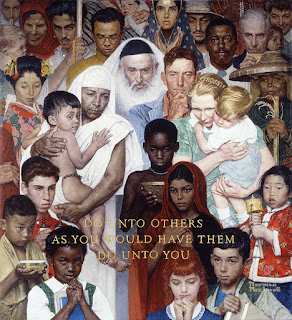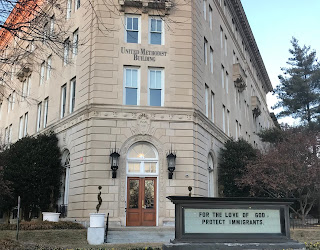The Golden Rule is our way of resisting evil in all it's forms, even
now when racism, discrimination and exploitation are so popular.
"Do for others what you want them to do for you. This is the meaning of the law of Moses and of the teaching of the prophets." Matthew 7:12 (GNT)
Jesus taught the Golden Rule and commented on it in this verse in a way that puts it on par with the great commandment of Moses. When He was asked what is the greatest of all
commandments, Jesus said, "The greatest is this, to love the Lord your God
with all your heart and mind and strength and soul. And the second is like unto
it, thou shalt love your neighbor as yourself." And then He commented on
that commandment almost the same words He says here, "On these two commandments hang
all the law and the prophets also." Matthew 22:36-40.
Transcript of the [audio for this sermon] preached extemporaneously
at Briensburg UMC on July 21, 2019.
The Golden Rule doesn't just pop out as some random verse
in the Sermon on the Mount. The Golden Rule is the apex of the Sermon on the
Mount. The few verses remaining in the Sermon on the Mount after this is given
are Jesus landing the plane by telling us how important it is to implement all
these teachings that He's been talking about in this Sermon on the Mount. And by telling us the importance of building our lives on
a solid foundation like a wise builder would build their house on a rock and
not on the sand. Everything preceding just built up to this point. It begins with
the Beatitudes. He talks about prayer. He talks about love and forgiveness,
alms giving, all these spiritual things that He talks about. And as He approaches
the Golden Rule, He talked about not judging other people and then He puts a
little pillow there to lay the Golden Rule on when He talks about ask and ye
shall receive, seek and ye shall find, knock and the door will be opened unto
you.
Even anybody as bad as sometimes we are, as messed up
sometimes as we get, still if a child asked us for a loaf of bread, we wouldn't
give them a stone. Or if they asked us for an egg, we wouldn't give them a
scorpion. And He said even more think about how your heavenly Father wants to
give good things, right on top of all this about the providence of God which
He's already pointed out is for everybody. "He makes it to rain on the just and
the unjust." Now He places this Golden Rule.
Which Norman Rockwell has depicted here as our landmark
that we want to use today, the painting by that name where right in the middle
of the painting he wrote "Do unto others as you would have them do unto you." The
Golden Rule is universal. It's for us to apply in every situation in our lives.
This is the ethos of our faith. It's a call to empathy at it's most complete
levels. In every situation, in every relationship, you want to be helpful to
people and not hurtful. And that applies to every person that you know. Even
Jesus was talking about that's why it's so important to connect that with the
rest of the Sermon on the Mount because he said even to your worst enemy, "Do good to those
that revile you. Pray for those that persecute you."
This is our way of resisting the evil around us by doing
good. This is our way of pushing back against the people that are pushing from
the other way. We push back by loving them as Christ has loved us. We push back
by standing firm in our faith and belief in the teachings of Jesus and
implementing them in each situation. So it's universal in that sense, but it's
universal in the sense that it's for everybody to do. It's for everybody in
every situation. It's for all the other people for us to encourage that in
others too regardless of what their beliefs or practice may be regarding
religion or spirituality. This is for us to teach everyone, encouraging
everyone.
When you look at that picture, you can see people dressed
in all different outfits from all around the world, from all different faith
traditions. And if you look real close, the different people are carrying
different emblems of their faiths, different religions from around the world,
different cultures. The people of all different kinds and races and cultures
and beliefs and everything, you can tell by the expression, by what they're
wearing, by the tokens of faith that they're carrying.
This is a picture of a piece of paper that Norman Rockwell
typed up as part of his preparation for painting this picture. One thing was to
take a piece of paper and type up on there and do a little bit of research and
find out what all these different other religions said in the core of their
teachings that was similar to this. It's really the Golden Rule phrased
differently by these other different religions. It's a universal teaching. The
whole faith community comes together around this apex of all of our teachings.
And however we may understand anything else that we talk about or sing about or
pray about or argue about anything else, in whatever religion we have this is
the goal of spirituality. This is the high point of spirituality.
The Golden Rule is a universal rule for all humanity
regardless of what else we think or do or believe about anything. The Golden
Rule is collectively applied as well as individually, implementing the
teachings of Christ. It's to be implemented even in our groups. And many times
when we think about the judgment of Christ and think of the great white throne
judgment and we all picture there like we're all standing in line waiting our
turn, the books are open, each one of us individually judged according to the
things that are written in that book. But in Matthew 25 when Jesus talks about
dividing the sheep from the goats, He speaks of that as the judgment of the
nations. That's pretty inclusive of everybody as a group. What we do as that
two or three when we gather together, what we decide, the Golden Rule still
applies.
What we do as a congregation, as a community, as
government entities, as state and national organizations, worldwide. Everything
that we do no matter who we're doing it with it still stands under this
judgment of almighty God. And we have our place in that. So we have our
responsibility to that. What we may be able to do might not be very big. Might
be like the people that were given little investments by the guy that went on a
journey in the Bible. And the one guy didn't have very much so he thought he
would just bury his talent while the other two invested theirs. And when the
master came back, found out that wasn't the right way to do it.
We may only be able to pray. We may be only to say a word
here or there or do something, we may not be able to do much. Remember back
when they restored the Statue of Liberty, they did that with pennies. And now
the politicians, who are they going after? Saw this on the news or on your
email? Those little one dollar, five dollar donations because a whole bunch of
small things adds up to a whole lot more than a few big things. We're called to
apply the Golden Rule collectively as well as individually.
And then in our church we have this general rule, "Three General Rules," that date back to before the Methodists were called Methodists.
When they were just kind of meeting and talking about and they had these rules
about how to implement the teachings of Christ systematically, methodically in
our personal lives, in our group lives, how we can group together, in our
church life or in our political life.
And rule number one, "Do no harm." Think about that in relation to the Golden Rule. If you
don't want anybody harming you, don't harm other people. And number two then, "Do good." Do the kind of good to others that you hope others will do to you. And "Stay in love with God." Use the means of grace and make them available to
each other, emphasize them, see Christ in each other. Do the best we can for
each other. Share the sacraments of the church with the community.
Make everybody a part of the prayer life. Connect with
each other in prayer. Lift up each other in prayer. Study the Scriptures from
the viewpoint of Jesus and His love. We apply the Golden Rule to the way we
practice our religion and our faith then it transforms our religion and our
faith in our personal and corporate spirituality.
So the Golden Rule is not like orders from headquarters or
just something to debate and discuss as an interesting idea or a philosophy to
consider. The Golden Rule is an invitation. An invitation to join Jesus and the
other spiritual masters of faith through the ages. To do as Paul said, "sit in
the heavenly places with Christ." The Golden Rule is our pathway to the heavenly
places, to the ultimate goals that we feel in our hearts and minds about what
spirituality is for. As we practice and implement the Golden Rule, we go up a
few notches. And when we don't, we go down a few notches in our faith journey,
in our own spiritual lives. And we take everybody around us with us either way.
Christ brings us this great invitation, this great opportunity to practice and to implement and to share and to call others to join us. In doing unto others as we would have others do unto us.
In the name of Jesus, Amen.


